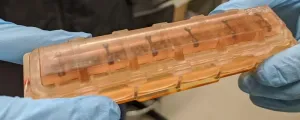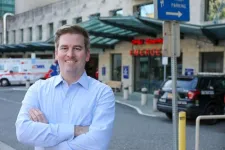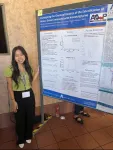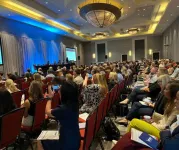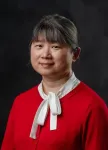(Press-News.org) Johns Hopkins Medicine scientists who arranged for 48 human bioengineered heart tissue samples to spend 30 days at the International Space Station report evidence that the low gravity conditions in space weakened the tissues and disrupted their normal rhythmic beats when compared to earth-bound samples from the same source.
The scientists said the heart tissues “really don’t fare well in space,” and over time, the tissues aboard the space station beat about half as strong as tissues from the same source kept on Earth.
The findings, they say, expand scientists’ knowledge of low gravity’s potential effects on astronauts’ survival and health during long space missions, and they may serve as models for studying heart muscle aging and therapeutics on Earth.
A report of the scientists’ analysis of the tissues will be published during the week of Sept. 23 in the Proceedings of the National Academy of Sciences.
Previous studies showed that some astronauts return to Earth from outer space with age-related conditions, including reduced heart muscle function and arrythmias (irregular heartbeats), and that some, but not all, effects dissipate over time after their return.
But scientists have sought ways to study such effects at a cellular and molecular level in a bid to find ways to keep astronauts safe during long spaceflights, says Deok-Ho Kim, Ph.D., a professor of biomedical engineering and medicine at the Johns Hopkins University School of Medicine. Kim led the project to send heart tissue to the space station.
To create the cardiac payload, scientist Jonathan Tsui, Ph.D., coaxed human induced pluripotent stem cells (iPSCs) to develop into heart muscle cells (cardiomyocytes). Tsui, who was a Ph.D. student in Kim's lab at the University of Washington, accompanied Kim as a postdoctoral fellow when Kim moved to The Johns Hopkins University in 2019. They continued the space biology research at Johns Hopkins.
Tsui then placed the tissues in a bioengineered, miniaturized tissue chip that strings the tissues between two posts to collect data about how the tissues beat (contract). The cells’ 3D housing was designed to mimic the environment of an adult human heart in a chamber half the size of a cell phone.
To get the tissues aboard the SpaceX CRS-20 mission, which launched in March 2020 bound for the space station, Tsui says he had to hand carry the tissue chambers on a plane to Florida, and continue caring for the tissues for a month at the Kennedy Space Center. Tsui is now a scientist at Tenaya Therapeutics, a company focused on heart disease prevention and treatment.
Once the tissues were on the space station, the scientists received real-time data for 10 seconds every 30 minutes about the cells’ strength of contraction, known as twitch forces, and on any irregular beating patterns. Astronaut Jessica Meir, Ph.D., M.S., changed the liquid nutrients surrounding the tissues once each week and preserved tissues at specific intervals for later gene readout and imaging analyses.
The research team kept a set of cardiac tissues developed the same way on Earth, housed in the same type of chamber, for comparison with the tissues in space.
When the tissue chambers returned to Earth, Tsui continued to maintain and collect data from the tissues.
“An incredible amount of cutting-edge technology in the areas of stem cell and tissue engineering, biosensors and bioelectronics, and microfabrication went into ensuring the viability of these tissues in space,” says Kim, whose team developed the tissue chip for this project and subsequent ones.
Devin Mair, Ph.D., a former Ph.D. student in Kim’s lab and now a postdoctoral fellow at Johns Hopkins, then analyzed the tissues’ ability to contract.
In addition to losing strength, the heart muscle tissues in space developed irregular beating (arrythmias) — disruptions that can cause a human heart to fail. Normally, the time between one beat of cardiac tissue and the next is about a second. This measure, in the tissues aboard the space station, grew to be nearly five times longer than those on Earth, although the time between beats returned nearly to normal when the tissues returned to Earth.
The scientists also found, in the tissues that went to space, that sarcomeres — the protein bundles in muscle cells that help them contract — became shorter and more disordered, a hallmark of human heart disease.
In addition, energy-producing mitochondria in the space-bound cells grew larger, rounder and lost the characteristic folds that help the cells use and produce energy.
Finally, Mair, Eun Hyun Ahn, Ph.D. — an assistant research professor of biomedical engineering — and Zhipeng Dong, a Johns Hopkins Ph.D. student, studied the gene readout in the tissues housed in space and on Earth. The tissues at the space station showed increased gene production involved in inflammation and oxidative damage, also hallmarks of heart disease.
“Many of these markers of oxidative damage and inflammation are consistently demonstrated in post flight checks of astronauts,” says Mair.
Kim’s lab sent a second batch of 3D engineered heart tissues to the space station in 2023 to screen for drugs that may protect the cells from the effects of low gravity. This study is on-going, and according to the scientists, these same drugs may help people maintain heart function as they get older.
The scientists are continuing to improve their “tissue on a chip” system and are studying effects of radiation on heart tissues at the NASA Space Radiation Laboratory. The space station is in low Earth orbit, where the planet’s magnetic field shields occupants from most of the effects of space radiation.
Kim is a co-founder, scientific advisory board member and equity holder of Curi Bio, which develops bioengineered tissue platforms for drug development. Ahn is Kim’s spouse and serves as a co-investigator or principal investigator of NIH grants: UG3EB028094, UH3TR003519 and R21CA220111.
Funding for the research was provided by the National Institutes of Health (UG3EB028094, UH3TR003519, UH3TR003271, R01HL164936, R01HL156947, R21CA220111).
Other researchers who contributed to the study are Jeffrey Chen from Johns Hopkins, Ty Higashi, Alec Smith and Nathan Sniadecki from the University of Washington, Paul Koenig and Stefanie Countryman from the University of Colorado Boulder, and Peter Lee from Brown University.
DOI: 10.1073/pnas.2404644121
END
Low gravity in space travel found to weaken and disrupt normal rhythm in heart muscle cells
2024-09-23
ELSE PRESS RELEASES FROM THIS DATE:
New approach to defibrillation may improve cardiac arrest outcomes
2024-09-23
Joshua Lupton, M.D., has no memory of his own cardiac arrest in 2016. He only knows that first responders resuscitated his heart with a shock from a defibrillator, ultimately leading to his complete recovery and putting him among fewer than one in 10 people nationwide who survive cardiac arrest outside of a hospital.
He attributes his survival to the rapid defibrillation he received from first responders — but not everybody is so fortunate.
Now, as lead author on a new observational study published in the journal JAMA Network Open, he and co-authors from Oregon Health & Science University ...
UTA undergraduate researcher wins state honor
2024-09-23
A student studying biological chemistry at The University of Texas at Arlington earned a state-wide award for her research on diazo compounds, the building blocks of some medications. Jenny Hoang, a senior, received the third-place award at the 2024 University of Texas System Louis Stokes Alliance for Minority Participation (LSAMP) conference held in El Paso in August.
“Honestly, I was so shocked that I won third place because I almost didn’t even apply for this program,” said Hoang, a Carrollton ...
Novel method detects biological oxidant derived from CO2 in cells
2024-09-23
High levels of carbon dioxide (CO2) in the atmosphere can alter not only the climate of our planet but also the functioning of our cells. The gas interacts with hydrogen peroxide (H2O2), which performs various functions in the human body, giving rise to a potent oxidant called peroxymonocarbonate.
"More and more evidence is emerging that peroxymonocarbonate is important in both cells’ adaptive responses via redox signaling and in cellular dysfunction. There is also epidemiological evidence that the levels of CO2 our cities are close to reaching cause a number of physiological problems. And the mechanisms underlying the toxicity of CO2 are ...
American Cancer Society experts presenting key research at 2024 ASCO Quality Care Symposium
2024-09-23
Scientists from the American Cancer Society (ACS) are presenting research studies at the 2024 Annual Meeting of the American Society of Clinical Oncology (ASCO) Quality Care Symposium (QCS) September 27-28 in San Francisco, CA. ASCO QCS offers research and education that encompasses the needs and viewpoints of multiple disciplines and various practice settings, attracting oncology professionals from around the world. This year’s program will feature studies complementing the meeting’s theme: “Driving Solutions, Implementing ...
New research identifies critical gaps in mental health care for adults with schizophrenia spectrum disorders
2024-09-23
New research finds that adults with schizophrenia spectrum disorders have high rates of comorbid mental and substance use disorders and significant social and economic disadvantages, and only 26% received minimally adequate treatment. Meeting the needs of people with schizophrenia spectrum disorders will require innovative interventions and implementation to improve access to and use of evidence-based approaches, the authors argue. The research was published today in Psychiatric Services in Advance.
The researchers, led by Natalie Bareis, Ph.D., ...
Advances in theranostics take center stage at SNMMI 2024 Therapeutics Conference
2024-09-23
Reston, VA (September 23, 2024)—More than 300 nuclear medicine clinicians, researchers, technologists, regulators and suppliers gathered in Bethesda, Maryland, on September 19-21, for the Society of Nuclear Medicine and Molecular Imaging (SNMMI) 2024 Therapeutics Conference. As the largest SNMMI Therapeutics Conference to date, the meeting offered attendees the chance to explore the latest innovations and advancements in theranostics and other nuclear medicine therapies as well as gain valuable insights into enhancing their practice.
This year’s Therapeutics Conference included eight distinct sessions covering advances in radiopharmaceutical ...
Firms that withdrew from Russia following Ukraine invasion earn higher consumer sentiment
2024-09-23
Following Russia’s 2022 invasion of Ukraine, many companies with operations in Russia withdrew from or severely curtailed their Russian operations. For example, Dell and McDonald’s ceased all operations in Russia after the invasion.
Many experts have argued that the corporate response to the Ukraine war is a striking example of stakeholder capitalism, a model where corporations are responsible for considering the interests of various stakeholders — including employees, customers, communities, governments and the environment — and not just ...
Biologist pioneers increased protein in staple crops, helps alleviate global protein shortage
2024-09-23
A Mississippi State biologist’s groundbreaking research in improving global nutrition and sustainability is featured this week in New Phytologist, a leading plant biology journal.
Ling Li, an associate professor in the MSU Department of Biological Sciences, has spent more than a decade studying rice and soybean crops, with the goal of providing a new strategy for crop improvement to increase protein content. Her work offers a potential solution to combat global protein deficiency, a condition affecting millions, particularly children, contributing to cognitive impairments, stunted growth and susceptibility to diseases like Kwashiorkor, ...
Wayne State University awarded grant to combat microplastics in the Great Lakes
2024-09-23
DETROIT — Wayne State University researchers recently received a grant from the Great Lakes Protection Fund to team with the Huron River Watershed Council, the Cleveland Water Alliance, Buffalo Niagara Waterkeeper and Resource Recycling Systems to help communities combat microplastics in water sources.
The project, “Mobilizing a Great Lakes Microplastic Action Network,” is led by Yongli Wager, Ph.D., associate professor of civil and environmental engineering and director of the Sustainable Water-Environment-Energy Technologies Lab in Wayne State’s College of Engineering. The project’s goal is to create ...
CU Anschutz experts identify key opportunities to strengthen climate education for health care professionals
2024-09-23
Doctors and researchers at the University of Colorado Anschutz Medical Campus published a discussion paper today highlighting key initiatives to help strengthen, train and prepare doctors and health care workers for the impact of climate change on human health.
The paper is published in the National Academy of Medicine Perspectives.
The authors, who come from a diverse background in health care from pediatrics to emergency medicine, and nursing to pharmacy, outline the importance of educating a climate-savvy health care workforce and highlight educational opportunities to fulfill the critical need.
“As climate change increasingly ...
